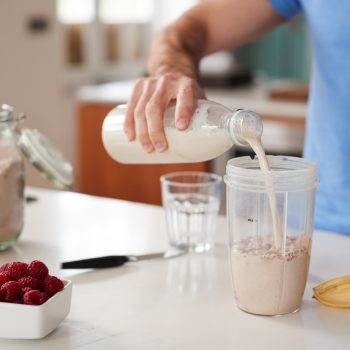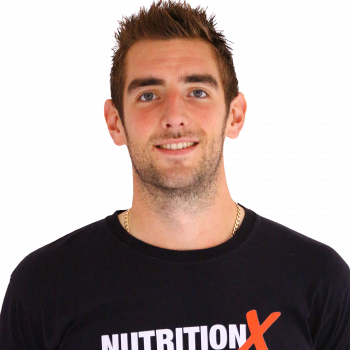Vegan protein powders have increased in popularity over recent years, with multiple options available on the market for those looking for a plant-based alternative to traditional whey or casein-based protein supplements. But what should athletes look for in a vegan protein powder? And what are the benefits to taking a vegan protein powder over an animal-based protein?
What is vegan protein powder?
Vegan protein powder is a high-protein supplement derived from vegan sources, as opposed to the traditional animal-sourced alternatives like whey and casein. Just like whey and casein protein powders, vegan protein powders can be consumed as a shake when mixed with plant-based milks or water, added to smoothies or even added to food - such as oats or baked goods - to create high-protein meals and snacks.
Vegan protein powders are made using protein extracted from plant-based foods such as pea, soy, hemp, brown rice and sometimes pumpkin seed or buckwheat. Pea and soy protein are the most common and highest quality of the vegan protein powders, chosen thanks to their superior amino acid profiles, and offer a great tasting alternative to other plant-based protein powders on the market.
How does vegan protein powder work?
Vegan protein powder, like pea protein, is a high quality source of protein to help athletes (and non-athletes) achieve their daily protein requirements in an easy and more convenient way, especially after training when food isn’t wanted or available. Just like traditional whey or casein based protein powders, vegan protein powders offer a tasty protein drink in an easy-to-consume form, perfect for post-training when supporting muscle recovery is vital.
How does vegan protein powder compare to whey protein?
Whey protein is considered the highest quality protein powder, with naturally high essential amino acids and more protein per serving; typically 20-25g per 25-30g serving. Pea protein powders have added essential amino acids to ensure a high quality product, just more powder is needed per serving to get the equivalent and required amount of protein.
Comparing the effectiveness of pea vs whey protein, research shows no difference in body composition, muscle mass and thickness, force production, performance and strength (Banaszek et al (2019). However, plant-based protein powders may be a better choice for athletes who experience gut issues when having whey or casein supplements. As whey and casein are derived from dairy sources, the lactose content may not be tolerated if similar symptoms are experienced after eating milk, cheese or yoghurt, so switching to a soy or pea protein could be beneficial in this respect; dietary preferences (ie. veganism) aside.
Is vegan protein powder low in calories?
Not necessarily, as this entirely depends on the type of vegan protein powder you’re consuming, as well as the animal-based alternative you’re comparing it to. Vegan protein powders will often be slightly higher in calories than whey protein alternatives because of the naturally higher carbohydrate content within them.
As a good example, our own plant based Pea+ Protein contains a huge 27g protein, 127 kCal and just 0.27g of sugar per 40g serving; making it a great high-protein, low-sugar vegan protein powder for athletes. In comparison, the Nutrition X Big Whey protein powder contains less calories at 119kCal but slightly less protein at 24.8g per 30g serving, whilst sugar is slightly higher at 1.44g.
How should I take vegan protein powder?
Just like traditional protein powders made from whey or casein, vegan protein powder can be mixed in water, plant-based milks, added to a smoothie, porridge, or used for baking homemade protein bars, protein balls, cakes, muffins etc. We have some protein recipes you can try here. Just be sure to pay close attention to recommended serving sizes, as well as counting your protein intake through the food you consume, to ensure your daily targets are being hit effectively.
Are there any real benefits OF taking vegan protein powder over whey alternatives?
There are several factors that should come into play when an athlete chooses which protein powder to use, ultimately opting for a protein powder or supplement that best suits them based on the following:
- Quality and purpose - We have learned that studies show whey protein to be superior in terms of quality thanks to its naturally high amino acid profile and protein per serving. However, there are plenty of high quality vegan protein powders like Pea+ Protein available.
- Moral reasons - For moral reasons, ie. wishing to avoid animal-derived produce, athletes may prefer a vegan protein over a whey or casein-based alternative.
- Gut tolerance - As outlined above, some athletes may suffer gut issues with dairy-based produce, which is where a plant-based alternative could be beneficial.
- Personal preference (like flavour and texture) - This is entirely subjective and down to the athlete themselves!
- Use and mix-ability (i.e. drink vs baking quality) - Some protein powders may work better when mixed with food or baked, or work better within a specific smoothie or recipe.
Athletes looking for a protein powder to help increase their total daily protein intake (i.e. for post-training recovery), should consider the points above to choose the best product. Ultimately, adding a single serving of either vegan or whey protein to a diet that already has regular hits of high quality protein from food will be very effective for improving recovery. Choosing a protein powder you enjoy and find easier to consistently take is the most important factor.
Do vegan protein powders have as good a protein profile as whey protein?
Gram for gram, whey protein has a superior amino acid profile than pea protein with naturally higher concentrations of the essential amino acids (EAAs) leucine, isoleucine, valine (the 3 BCAAs), threonine, methionine and lysine (Gorissen et al., 2018).
Whilst all vegan protein powders have their own individual benefits, we at Nutrition X have created a pea protein isolate-based protein powder as our vegan alternative to whey and casein - Pea+ Protein - specifically chosen thanks to its high BCAA profile. Unlike other plant-based proteins, pea protein contains a relatively high quantity of BCAA’s, including leucine, making it an ideal protein source for athletes needing to boost muscle growth and repair. We have also added additional leucine to give a total of 3.5g, taking this well above the theoretical 2.7g leucine threshold. Including this within a 27g protein serving will offer an athlete needing a plant-based alternative drink the right amount of high quality protein to aid recovery.
Gorissen, S.H., Crombag, J.J., Senden, J.M., Waterval, W.H., Bierau, J., Verdijk, L.B. and van Loon, L.J. (2018). Protein content and amino acid composition of commercially available plant-based protein isolates. Amino acids, 50(12), pp.1685-1695.




